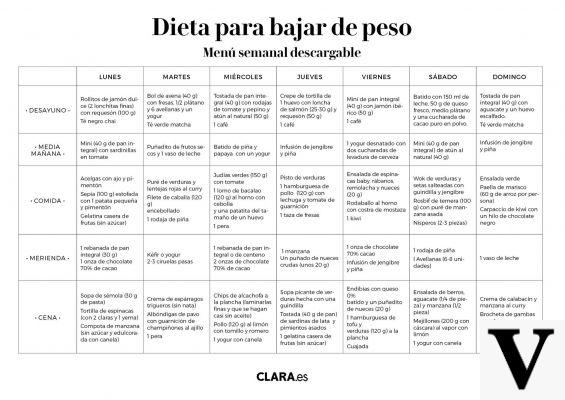
generality
When during the change of season we realize that last year's trousers or shirts have become a bit tight, we have two options: blame the washing machine or run for cover by putting ourselves on a diet.
In addition to allowing us to wear old clothes with elegance, the ideal diet to lose weight also helps us feel better about ourselves and, more importantly, improves our general psychophysical well-being.
Risks of Fast Diets
What are the risks of going on a diet at the last minute?
The most important enemies we face when deciding to lose weight are haste and laziness.
Haste is the most important enemy to fight
First of all, it is essential to realize that drugs, last minute weight loss diets and various supplements are not a remedy, but an aggravating factor of overweight.
Although a strict diet followed for short periods of time can be encouraging (the scales actually move to the left), the weight loss is mostly only apparent (the weight loss is mainly linked to the exhaustion of glycogen stores and to the dehydration). Only if the diet is maintained for a long time, weight loss is actually linked to a reduction in fat mass.
But the trouble doesn't stop there ... Highly calorie-restricted diets can affect muscle mass by saving (proportionally) fat and setting the stage for new weight gain.
If you choose to follow this path, the disadvantages are numerous despite the first, apparent, good results.
Some speculate that there may also be a reduction in basal metabolic rate due to caloric restriction; this is opposed to weight loss and, as soon as you start eating normally, all the lost kilos are regained in a short time with lots of interests.
Repeated cycles of weight loss and weight gain (yo-yo diets) spur the body to increase its ability to preserve fat accumulations to cope with the stages of food restriction.
To tell the truth, the scientific investigations carried out on the hypothetical reduction of the basal metabolism have denied the hypothesis that it can occur so easily; it is rather an undesirable effect of prolonged fasting. However, it should be noted that these experiments only examined the short-term reactions of fasting, leaving an unknown factor as to the long-term modifications of lower but more lasting caloric restrictions.
It can therefore become increasingly difficult to lose weight with a simple diet or through the use of slimming products. Here's why: a restrictive dietary approach (1000-1200 calories per day) associated with occasional binges (even one every 10 days is enough) cannot work.
For further information: Best Way to Lose Weight
Physical activity
Why can laziness defeat the whole strategy?
The contribution of a sedentary lifestyle to the development of overweight is very significant. Today, more than ever, many scholars agree that weight gain is linked more to a reduction in physical activity than to an increased calorie intake.
In America, for example, the average weight of Americans has risen despite the fact that overall calorie intake has dropped by 5-10% in recent years.
Let's see some fundamental points concerning physical motor activity:
- Nine times out of ten a weight loss program based solely on food restriction fails. Despite the good will, many of the diets started with the aim of losing weight are in fact abandoned in the throes of hunger pangs that frustrate the efforts previously made.
- The only solution to this problem is to increase your level of physical motor activity. A similar approach allows in many cases to lose weight even in the absence of a dietary restriction (referring to the previous normocaloric intake).
- In fact, athletes have a higher metabolism and this means that their energy consumption is higher even at rest.
- In addition, sports practice allows you to keep the muscles intact by preventing catabolism.
It is therefore necessary to combine diet and physical activity to obtain the best results.
To learn more: Effective Solutions to Lose Weight
Advice
Useful tips to follow in the diet to lose weight
In the case of a diet to lose weight, it may be useful to follow some tips:
- Follow a varied and balanced diet that creates not excessive caloric deficits (maximum 500 kcal below the requirement).
- To quickly calculate your ideal weight and the calories needed to reach it, use our automatic calculation module.
- To avoid overeating or giving in to too many temptations, brush your teeth at the end of the meal or put chewing gum or sugar-free aromatic candies in your mouth.
- Eat slowly, so you feel full faster.
- Perform a mixed physical activity, alternating aerobic exercises (stationary bike, running, brisk walking, cross-country skiing, long-term swimming) with other muscular ones (weights, toning exercises with free body, with weights or with elastic bands).
- To obtain the maximum slimming effect, physical activity must be prolonged over time; only in this way will the improvements in body composition and metabolism be stable and lasting.
- Losing weight is important but always with an eye to your health; to set up your diet, therefore, refer to our food recommendations.


























